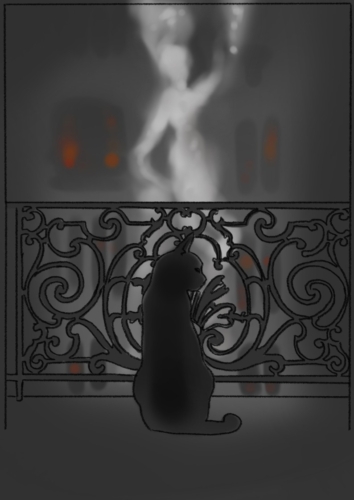The Familiar

Illustration by Mara Wiedner
The autumn sun filtered through the branches above, washing the forest floor in a dim yellow glow, while the birds began to chirp their “Good morning world!” songs. I opened my sleepy green eyes, yawned widely, and stretched out my paws. My agile black limbs had grown stiff from the hours spent curled beneath a piece of shrubbery, the spot I had chosen to escape from last night’s rain. There is nothing I hate more than my tail getting wet, so I had bundled myself atop a pile of mostly dry, reddish-brown leaves that smelled rather strongly of mildew and tree sap, waiting for the cold, drizzly evening to pass.
I sat up and licked one nimble leg, cleaning away some earth that had dried and crusted between my paw pads from my adventures of yesterday, as my tummy began to rumble ravenously. I hadn’t managed to eat much on account of the bad weather, so I set about fixing this, immediately filling my belly with whatever I could find. An acorn, a rat, I very nearly caught a squirrel, but it escaped at the last moment. As I scurried further out of the forest, I came to the treeline and peered down from the top of a muddy, sloping hill.
Below me lay a village, with thatched-roof houses scattered at random and brimming with grimy-faced, toothless two-legged creatures, their angry red mouths spewing profanities at one another. There were horses tied to makeshift fences, munching mindlessly on bales of straw, while dogs barked and nipped at their heels. Smaller kinds of these two-legged creatures ran around chasing each other, jumping ropes or chanting ominous songs — all with greenish, sickly complexions, runny noses, chesty coughs, and dirt crusted beneath their claws.
For whatever reason, these two-legged creatures do not treat me kindly — though I cannot recall ever having done something to deserve their inhospitable feelings. They do not care that I am hungry, and pay no attention to my polite mews when I see them carrying bundles of fish from the market. They do not like to share with me, despite my skinny body and protruding ribs. The nicer ones simply shoo me away, calling me “the Devil’s helper,” or kick some rocks in my direction to send me sauntering off in a hurry. The meaner ones pick me up, try to drown me, slice me up, and make me bleed across their hunting blades. The “children” (for that is what these dreadful creatures call their smaller ones) tear out pieces of my fur, soft black clumps from behind my ears — spitting venomously all the while. Sometimes they run after me with massive sticks until I am left cornered with no escape, cowering in fear, hissing and doing my best to look as big and scary as they are to me. I do not know what I have done wrong.
I used to have a home. A very nice home. With a kind lady that had long dark hair; living by herself, not too far from this village. She used to read lots of books and would simmer wonderful smelling liquids on a big stove — medicines that would cure bad dreams, soups for migraines, even balms for my scratches and scrapes. She always took care of me. Her splendid garden overflowed with all sorts of herbs, plants, and flowers, plus there were plenty of mice for me to hunt. We would go out together to forage for berries and chop firewood for the hearth. I would sit with her whilst she sorted her ingredients, making notes in a big notebook with purple-red binding, dipping her quill delicately into ink and letting lovely swirls across the page. In the evenings, she would share her supper with me, comb my black coat free of its tangles with a special brush she had made by hand, and readjust the bow ribbon tied as a collar around my neck. Emerald green, “to match my pretty eyes,” she said. She would sit with her knitting, and with me curled on her lap, I felt sleepy and safe, and purred.
And then she was taken away.
We were interrupted one dark, blustery October night by the sound of an approaching crowd. Peering from the windows, we saw the pitchforks, the blazing torches — the nightmare blurred by a torrential onslaught of wind and rain. They were screaming the word “witch!” My girl hurried from the window, her white nightdress billowing like wings, bundling me up in her arms.
When I close my eyes, I can still feel the way her heart was beating that night. How cold her hands felt, how they trembled. In that brief yet interminable silence before we were torn apart, we locked eyes. Hers were brown and wet, filled with tears. We knew, without making a sound, that we were saying goodbye.
The crowd burst in, pulling me from her arms as I clawed and shrieked. They put a bag over her head, and forced her to her knees, her whole body deathly white, before binding her tightly. They paraded her through the streets, me following unnoticed in the shadows, until we reached the centre of a large square—where a massive pile of wood and a waiting post stood. To this post they tied my girl, terrified and weeping. Then they set fire to the wood, sending the flames licking upward towards her feet, her ankles, her thighs, her heart, her head… her screams, excruciating, I can still hear them. I hid my face in my paws. I was not brave. I could not watch.
For days after, the smoke continued to rise and drift.
There were others like her too.
I do not know what she or I or we ever did wrong.
I do not know.
Written by Brooke




